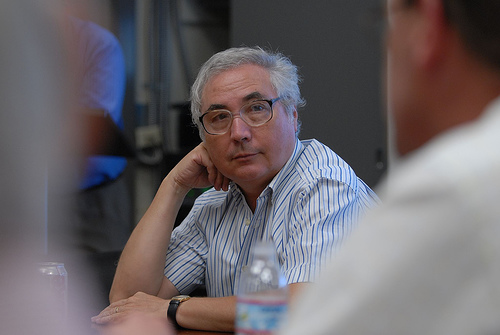
Manuel Castells (Flickr user uscpublicdiplomacy)
What do the MP expenses scandal and the protests in Iran have in common? Both of them reflect how communication power can change the world – or rather, change the way we see it – says Manuel Castells.
I had the opportunity to listen to most of Manuel Castells’ public lecture at the LSE tonight. Manuel Castells has recently been the most influential scholar on the subject of communication and technology, announcing the arrival of the “network society” (one of his strengths is finding sticky labels for what he studies, as tonight’s lecture proved again).
Here’s his argument in a nutshell.
For the masses, by the masses
Power is one of the most important topics in any society, as we might all agree. For Castells, one of the most important powers is to “control human minds” and to shape meanings.
The media immediately come to mind as probably the most powerful institution to shape the way we see the world. And we need to understand that the media are mainly big business, says Castells. Globalized, decentralized, but actually highly concentrated business.
And then we got “mass self-communication” nowadays (one of those new sticky labels you should watch out for). Horizontal, many-to-many forms of communication such as Twitter, Facebook, Youtube, you name them.
As you can imagine, big media and mass self-communication don’t just peacefully coexist. They interact – somehow, sometimes, somewhere. Castells left it at that during his lecture.
Scandal politics
So far, Castells didn’t really say anything new (although he once again managed to present these points more clearly than you will find them anywhere). The real question was, how does mass self-communication change the distribution of communication power?
To answer this, he first went on to criticize big media for their focus on scandals when reporting politics. In fact, he argues that the media are running a “scandal industry” based on leaked, remixed, half-true information and semi-legal but definitely unethical investigation methods (see phone tapping case in today’s papers). Politicians must play along because they see undermining the opponent’s character as the only reliable political weapon.
Interestingly, there is no conclusive evidence, says Castells, that discrediting your political opponent always pays off. To the contrary, in several cases, it had a negative effect.
More importantly, scandal politics cause massive damage for the entire political system by undermining it’s legitimacy. That is why the vast majority of people around the world believes that democracy is failing and that they are not governed by “the people” (always an exception: Scandinavia). And when mistrust in the political system is met by mistrust in the economic system, we’re in big trouble.
The way out
So too much communication power in the hands of big media is really bad. But can mass self-communication make a difference?
Castells believes it can and it already does. His arguments are pretty well-known though, I must say. The services and technologies facilitating mass self-communication are much harder to control from top down, offer a much wider spectrum of opinion and information, by-pass any corporate or editorial control, and feature close to no entry costs. In other words, mass self-communication is autonomous.
This has already made a huge difference in politics, argues Castells. The success of social movements over the last 15 years would not have been possible without mass self-communication.When these movements go online, they form “instant political communities of practice” (another of those sticky labels).
For example, we don’t know much more about climate change than we did some 30 years ago. However, the Internet has spread the word so that 85% of the world population has now joined the global environmental movement. Another case in point would be the protests in Iran.
Early exit
Unfortunately, I had to leave at this point. Until then, Castells had argued that mass self-communication offers an alternative way through which we can see the world and make sense of it – outside any big media with all its scandals.
I had two major problems with his argument up until this point. (Maybe they were mentioned in the Q&A session?)
First, I really question the autonomy of mass self-communication. It has to rely on services which cost billions a year and which are operated by equally big business (News Corp. owns MySpace, etc.). There’s a lot to say about concentration and commercialization on the internet.
Second, I don’t quite see why mass self-communication should be any less susceptible to scandals. In fact, doesn’t it allow them to spread even fast, even more uncontrollably, possibly even more unethical?
I would love to hear your comments and maybe some notes on the last few minutes of Castells’s lecture. Thank you!

